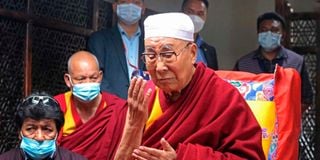Premium
China’s tough Covid policy challenges rule in autonomous regions

Tibetan spiritual leader Dalai Lama offers prayers during his visit at the Shah-e-Hamdan mosque at Shey village in Leh on August 16, 2022.
In the world’s largest country by population size, how do authorities keep their hold while fighting a pandemic? The lessons from China may show that you could win one and weaken the other.
This week, Chinese authorities in the Tibet Autonomous Region (TAR) reportedly suspended more than 100 officials for failing to contain the spread of Covid-19.
And according to the South China Morning Post, the number is just for August as the region battled an infection rate loathed in China. Tibet accounted for 503 cases out of 1294 reported across the country by Sunday, according to state news agency Xinhua.
The Chinese National Health Commission says Tibet is one of the hotspots alongside Sichuan and Hainan provinces.
The 100 officials will face disciplinary action for ‘negligence’, according to local news outlet Tibet Daily. They could be fired, warned or fined.
China, where the first cases of Covid-19 were discovered in late 2019, initially reported heavy caseloads with an infection rate that profited from crowding to spread fast. Authorities then imposed a zero-covid policy where residents are routinely tested, quarantined or forcibly vaccinated.
Today, China is one of the few countries in the world where near-full restrictions are still in place, regardless of vaccination status.
Yet that policy has drawbacks, especially in autonomous regions like Tibet.
The outbreaks and the crackdown are a direct impediment to the Chinese Communist Party (CCP) which seeks to strengthen its development narrative.
Last week, Xinhua reported that the CCP has aided Tibet’s previously undeveloped, mountainous region to economic prosperity. The news agency, in a commentary, said this reflected political and institutional advantages.
“China’s unswerving drive to rally national support for the Tibet Autonomous Region has helped transform a once poor, backward old Tibet into a new Tibet featuring economic prosperity and happiness of its people over the 71 years since the region’s peaceful liberation in 1951,” Xinhua report said.
China claims authority over Tibet although allegiance of some of the Tibetans lie with the Dalai Lama, the spiritual leader exiled in India.
“With a view to helping Tibet shake off poverty, China has leveraged its institutional strength of mobilising resources for major undertakings, pooling nationwide strengths to support the development of Tibet.”
However, rights groups say the view is largely focused on economic figures and physical infrastructure, rather than the impact on the people.
Tibet Rights Collective, a rights watchdog on Tibet, says China has “committed gross human rights violations” by imposing its rule on a region that once sought independence.
TRC says Tibetan children have been prevented from studying in their language and compelled to study in mandarin schools including kindergartens.
The TRC also accuses Chinese authorities of hiding certain data on economy such as debt in calculating economic status.
China took control of Tibet in 1950 after ejecting the Dalai Lama and making it its territory in south-western part of china.
But locals, while poor themselves, say the region had natural resources and as a water source for countries, which China has exploited.
Tibet isn’t the only autonomous region China is facing accusations of violations. Last week, UN Special Rapporteur on Contemporary Forms of Slavery Tomoya Obokata released a report on Xinjiang showed there have been instanced of forced labour in the region as well as Tibet.
Xinjiang, north-western China, has been under a controversial counter-terrorism policy which China argues has helped end extremism. But Western critics say the people there have been forcibly stopped from religious freedom and forced to camps to abandon their beliefs. China rejected the report as a fabrication.
Meanwhile, the Dalai Lama may irk China some more after his representative office in Taiwan claimed the region China considers its territory will be willing to host him.
Representative Kelsang Gyaltsen told India Today that many Buddhist followers have been writing to his office urging the Dalai Lama to visit Taipei, the capital of Taiwan.
“We have received a lot of requests appealing for His Holiness the Dalai Lama to visit Taipei. We prepared a representation for the Ministry of Foreign Affairs. I have informed them of the requests. We would like to see a visit of His Holiness,” Gyaltsen was quoted as saying.
The Dalai Lama has been in Taiwan before in 1997, 2001 and 2009. But subsequent trips were curtailed by Beijing which considers him as a separatist threat.





